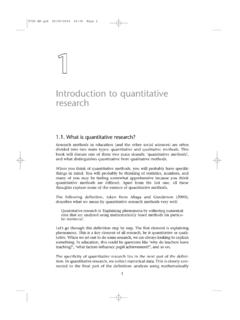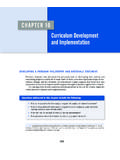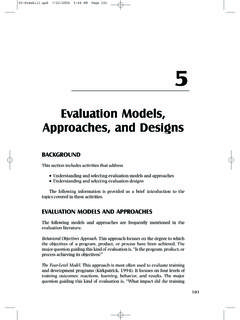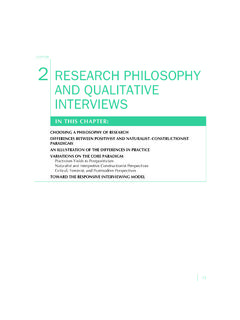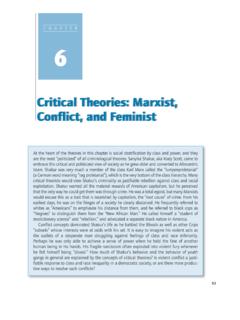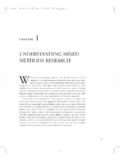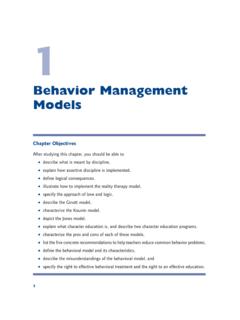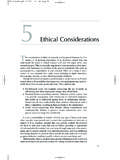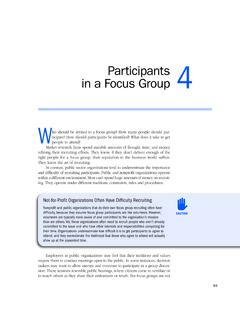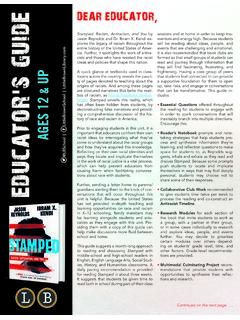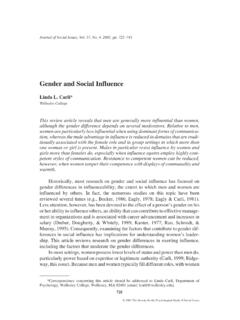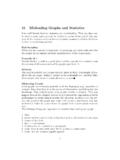Transcription of Analyzing Focus Group Data - SAGE Publications Inc
1 7 Analyzing Focus Group DataThe analysis and interpretation of Focus Group data require a great deal ofjudgment and care, just as any other scientific approach, and regardless ofwhether the analysis relies on quantitative or qualitative procedures. A greatdeal of the skepticism about the value of Focus groups probably arises from theperception that Focus Group data are subjective and difficult to , the analysis and interpretation of Focus Group data can be as rigor-ous as that generated by any other method. It can even be quantified and sub-mitted to sophisticated mathematical analyses, though the purposes of focusgroup interviews seldom require this type of analysis.
2 Indeed, there is no onebest or correct approach to the analysis of Focus Group data. As with othertypes of data, the nature of the analyses of Focus Group interview data shouldbe determined by the research question and the purpose for which the data most common purpose of a Focus Group interview is to provide an in-depth exploration of a topic about which little is known. For such exploratoryresearch, a simple descriptive narrative is quite appropriate and often all thatis necessary. More detailed analyses are simply neither an efficient or produc-tive use of time, unless they serve a particular research objective.
3 However,there are additional methods of analysis that may be appropriate for certainpurposes. In this chapter, we consider the methods of data analysis that aremost frequently used with Focus Group data. We begin this discussion by con-sidering the question of how much analysis is MUCH ANALYSIS?Like most types of research, the amount of analysis required varies with thepurpose of the research, the complexity of the research design, and the extentto which conclusions can be reached easily based on simple analyses. Themost common analyses of Focus Group results involve a transcript of the dis-cussion and a summary of the conclusions that can be drawn.
4 There are occa-sions, however, when a transcript is unnecessary. When decisions must bemade quickly (which is common in marketing studies) and the conclusions 6/6/2006 11:46 AM Page 109the research are rather straightforward, a brief summary may be all that isnecessary. In some cases, there may be time or budget constraints that preventmore detailed analysis. In other cases, all interested parties and decision makersmay be able to observe or participate in the Group , so there may be little needfor a detailed analysis or report. Nevertheless, some type of report is almostalways helpful, if only to document what was done for historical and the results of a Focus Group are so obvious as to require little sup-porting documentation, detailed analysis is probably not worthwhile.
5 One ofthe authors was involved in a series of Focus groups on a new government pro-gram that was so clearly unacceptable and elicited so many objections that fur-ther analysis of any kind seemed unwarranted. In this case, the decision aboutthe program was made quite clear by the Focus Group discussions. This is, infact, a good example of how useful Focus groups can be as evaluative tools. Itis often the case that government planners, product design engineers, and otherprofessionals who design products and services believe that they understandwhat their clients or customers need or should want.
6 Focus groups provide atool for testing the reality of assumptions that go into the design of services,programs, and products. On the other hand, if the researchers in this examplewere interested in more than making a simple go/no go decision about a prod-uct or program and instead wished to explore in detail the reasons the programwas unacceptable and the types of programs that might be acceptable, moredetailed analyses would be needed. Thus, the amount of analysis and the levelof detail and rigor ultimately depend on the purpose for which the research iscarried out and the cost-benefit of carrying out an analysis at a given from the few occasions when only a short summary of Focus groupdiscussions is required, all analytic techniques for Focus Group data requiretranscription of the interview as a first step.
7 Thus we consider the issues sur-rounding the transcription process and then turn our attention to some of themore common tools for analysis of Focus Group THE INTERVIEWThe first step in many approaches to the analysis of Focus Group data is to havethe entire interview transcribed. Transcription services are readily available inmost cities and are generally able to provide relatively rapid turnaround atmodest cost. Transcription not only facilitates further analysis, but also it estab-lishes a permanent written record of the Group discussion that can be sharedwithother interested parties.
8 On the other hand, in research situations that are time110 Focus 6/6/2006 11:46 AM Page 110pressured or involve fairly mundane issues ( , advertising copy testing), atranscript may not be prepared. In these cases, the researchers rely on detailednotes taken by the Focus Group observers, or they may also replay the audio-or videotape of the Group as amount of editing that the analyst does on a transcribed interview is amatter of preference. Transcriptions are not always complete, and the moder-ator may want to fill in gaps and missing words, as well as correct spelling andtypographical errors.
9 There is a danger in this, of course, because the modera-tor s memory may be fallible or knowledge of what was said later in the courseof the interview may color the memory of what happened also will faithfully pick up incomplete sentences, half-fin-ished thoughts, parts of words, odd phrases, and other characteristics of thespoken word in a Group discussion . These characteristics are true to the flowof the discussion , but they may make it difficult for a reader to follow the editing may increase readability, but it is important that the character ofthe respondents comments be maintained, even if at times they use poor gram-mar or appear to be confused.
10 Because one use of Focus Group interviewing isto learn how respondents think and talk about a particular issue, too muchediting and cleaning of the transcript is undesirable and the transcript is finished, it can serve as the basis for further analysis. Itshould be noted, however, that the transcript does not reflect the entire characterof the discussion . Nonverbal communication, gestures, and behavioral responsesare not reflected in a transcript. In addition, the way members of the Group usewords and the tone with which words are used are important sources of infor-mation and can radically alter the interpretation of a statement.


